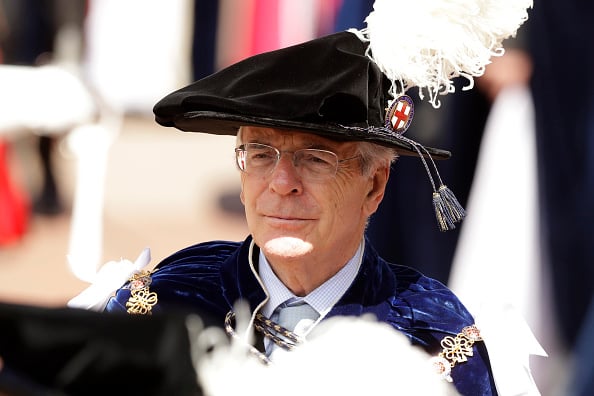What is John Major’s Net Worth?
John Major is a British conservative politician who has a net worth of $50 million. John Major served as the prime minister of the United Kingdom from 1990 to 1997. Before that, he was a Member of Parliament for Huntingdon, and served as foreign secretary and chancellor of the Exchequer during the final years of Margaret Thatcher’s government. As prime minister, Major created the Citizen’s Charter, sent British troops to the Gulf War, and passed a number of criminal justice and education reforms, among other actions. Sir John was awarded the Companion of Honour by the Queen in 1999 and he stood down from Parliament in 2001. On St. George’s Day, 2005, Sir John was appointed a Knight Companion of the Most Noble Order of the Garter by Queen Elizabeth II.
Early Life
John Major was born on March 29, 1943 in St Helier, Surrey, England to Gwen and former musical hall performer Tom. He had two older siblings named Terry and Pat. After the Germans bombed their area in Surrey during World War II, the family moved to Saham Toney in Norfolk. Educated at the Cheam Common School beginning in 1948, Major enjoyed reading and playing football and cricket. He went on to attend the Rutlish School. The family’s fortunes took a hit in the 50s when Major’s father fell ill and a recalled business loan forced them to move to a cramped flat in south London. Moreover, Major dropped out of school just before turning 16 in 1959.
Career Beginnings
After leaving school, Major became a clerk at the insurance brokerage firm Price Forbes; however, he soon quit. He subsequently worked with his brother at the family’s garden ornament business for a few years, and joined the Young Conservatives in Brixton. In late 1962, Major began working for the London Electricity Board. He went on to become increasingly involved in politics throughout the 60s, assisting local Conservative candidates Kenneth Payne and Piers Dixon in their respective general elections. Eventually, Major left the London Electricity Board and joined the District Bank; he then joined Standard Bank a year later. In 1968, he assumed his first public political position when he was elected as a Conservative councilor on the Lambeth London Borough Council. A couple years later, he became chairman of the Housing Committee.
Member of Parliament
In the 1979 general election, Major won the Conservative Parliament seat for Huntingdon as the Conservative Party returned to power with Margaret Thatcher as the new prime minister. Major held various junior government positions in the early years of Thatcher’s reign, including Parliamentary Private Secretary and assistant whip. Following the 1987 election, Major was promoted to Thatcher’s Cabinet as chief secretary to the Treasury. Later, he was promoted to the position of foreign secretary, and then to chancellor of the Exchequer.
Getty
Prime Minister
In late 1990, Major succeeded the recently resigned Thatcher as prime minister of the United Kingdom. Two years later, he led the Conservative Party to another election victory, winning over 14 million votes, a record for any British political party. Major served as prime minister until 1997, when Tony Blair and the Labour Party trounced the Conservatives to take back the government.
Major was behind numerous significant actions during his seven-year premiership. Early on, he created the Citizen’s Charter, which aimed to improve public services in the UK. He also eliminated the Poll Tax and replaced it with the Council Tax; led his country’s negotiations over the European Union’s Maastricht Treaty; and initiated the Northern Ireland peace process. Meanwhile, in international affairs, Major committed British troops to the Gulf War and later oversaw the peaceful handing of Hong Kong back to China. He was less successful with his “Back to Basics” campaign, a reactionary appeal to traditional family values that was heavily derided. Among his other actions, Major passed education and criminal justice reforms and privatized railways and the coal industry.
In mid-1995, multiple scandals and divisions within the Conservative Party led to Major’s resignation as party leader; despite this, he sought and won reelection. Still, public opinion of his leadership was poor, and by late 1996, his government had lost its House of Commons majority. This culminated in the Labour Party’s massive victory in the 1997 election, putting to a close 18 years of Conservative government. After Tony Blair became the new prime minister, Major resigned as the leader of the Conservative Party.
Post-Political Activities
Major retired as a Member of Parliament in 2001. He went on to get involved in a wide range of endeavors related to sports, charity, and business. In 2005, Major was elected to the committee of the Marylebone Cricket Club, and two years after that released a book about the history of cricket. On the charity side of things, he became the president of Asthma UK and a patron of such organizations as Sightsavers UK, Mercy Ships, and the Prostate Cancer Charity. In regard to business, Major took up appointments such as senior adviser to Credit Suisse; chairman of the board of senior advisers at Global Infrastructure Partners; and chairman of the international advisory board of the National Bank of Kuwait. He has also been involved in numerous think tanks.
Personal Life
In 1970, Major wed Norma Johnson, a fellow member of the Young Conservatives. They have two children named Elizabeth and James. In 2002, it was revealed that Major carried out a four-year-long extramarital affair with Conservative politician Edwina Currie from 1984 to 1988.

